Refugees from Vietnam and their offspring grapple with lack of citizenship after more than three decades
Due to conflict between the two countries, more than 200,000 mostly ethnically-Chinese residents of Vietnam fled to China from 1978 onwards. Now more than three decades later, these refugees and their children have permanently settled in China. But they are officially regarded as neither Vietnamese nor Chinese by the government.
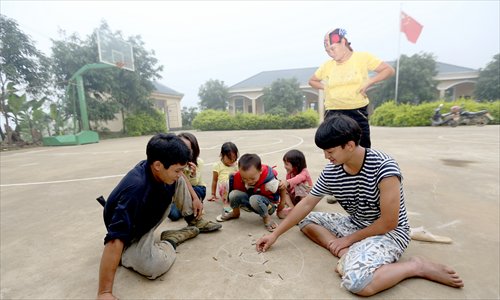
"Refugees" play chess on a playground in Laowachang village, Yunnan Province. Photo: Cui Meng/GT
After spending nearly three-quarters of his life in China, Deng Wenlin's biggest dream is to become a Chinese citizen.
Deng, 45, left the country where he was born when Vietnam exiled its ethnic Chinese population in 1979. Facing persecution, Deng and his family fled to Southwest China's Yunnan Province, the country where his parents had once lived.
Because they were unable to prove to the government that they were ethnically Chinese, they have been classified as "refugees" ever since.
Now that more than three decades have passed, Deng says Vietnam is only a distant memory to him.
"I see myself as Chinese, I don't want to return to Vietnam any more. China is my home," he said firmly.
Deng is head of Laowachang village in Hekou county, which borders Vietnam. It is called the "refugee village" by locals because it hosts 482 refugees like Deng.
Along the border, so-called "refugee villages" are common. In 2005 the number of such refugees and their children - who are also denied Chinese citizenship - reached 295,000. Among them, 99 percent are from Vietnam or have parents from Vietnam, according to 30 Years of Civil Affairs, a book edited by former Minister of Civil Affairs Li Xueju.
From 1978 to 1985, more than 50,000 refugees entered China through Hekou county alone. More than 4,000 refugees eventually settled in the county, according to the local civil affairs bureau.
"These refugees are vulnerable. They may become a destabilizing factor for society. It's important that the relevant government organs address their problems," Zhuang Guotu, head of the Center of Southeast Asian Studies at Xiamen University, told the Global Times.
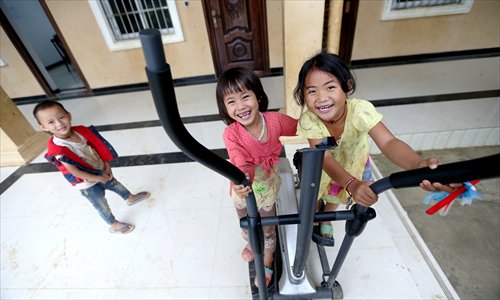
Two girls, both "refugees" born in China, play a game. Photo: Cui Meng/GT
Exiled community
In the late 1970s, there was strong anti-Chinese sentiment in Vietnam, with members of the country's long-standing Chinese community facing discrimination. The situation turned into a crisis around the time of this 1979 Sino-Vietnamese war that followed Vietnam's invasion of Chinese ally Cambodia.
Refugees started to flood across the border in 1978. In the Guangxi Zhuang Autonomous Region's Dongxing township alone, 4,000 refugees arrived one day, swamping the 10,000 residents.
Li Yulin, 48, is the deputy head of Laowachang. Born in Vietnam, he still vividly remembers fleeing to China with his family in 1980.
"My mother was seriously ill then, so we delayed our journey for one year. We were under serious persecution in Vietnam then," he said.
Deng said that Vietnamese soldiers believed local Chinese were helping the invading forces, and would often beat them.
Li's mother led them from their village one night, abandoning all their belongings.
Worried that a flashlight might give them away to Vietnamese soldiers, they walked in a line holding onto each other's clothes to stick together, all stumbling along the steep mountain road. "This was so hard for us. What my family has suffered is too bitter for me to recall," he said.
Deng's family, who came to Laowachang one year before Li's, said that when they first settled in the area, it was barren. Local residents were not happy to see them settling in the area and demolished the refugees' homes.
"We didn't give up when they destroyed our houses. We built our houses again and again at night when they were sleeping. Gradually, they gave up," Deng said.
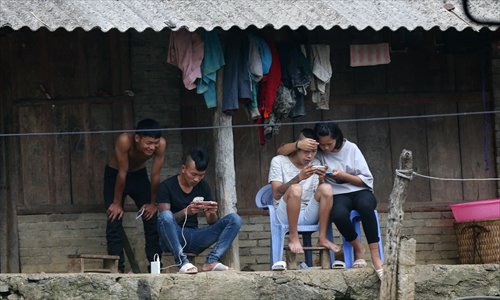
Young people living in refugee villages say they consider themselves Chinese. Photo: Cui Meng/GT
Facing hardship
Following the resumption of bilateral ties in 1990, China asked Vietnam to allow refugees to return to the country but Hanoi officially refused to do so. "Negotiations between the two governments have not been successful," Verrapong Vongvarotai, Beijing-based regional representative for the UN High Commissioner for Refugees (UNHCR), said in a 2007 article published on the UNHCR website.
Refugees were not given the identification cards or hukou (household registration) booklets, essential for almost every kind of interaction a Chinese citizen has with the government, until 2005. In their hukou booklet, the nationality column is blank.
"I was overjoyed when I got my ID and hukou booklet. They were so useful," said Deng.
Before they had their ID card and hukou, they couldn't migrate to a city for work or apply for a bank loan, among many other limitations.
Tao Xingzhen, 35, was born in "189 refugee village," one of the first refugee resettlement areas established in Hekou. About 100 households live in the village, most of whom are refugees from Vietnam and Chinese ethnic minorities including Miao, Buyi and Dai.
When Tao was in her early 20s, she hoped to work in a big city and get married outside of her village. But her wishes were in vain without ID and citizenship.
"They [Chinese citizens] didn't want to marry a woman who is a 'refugee.' They worried that this will bring troubles to the children's hukou," Tao said.
Tao later married a man from her village. "I'm still longing for the life outside. But I can't make it anymore. My parents are getting old. I can't simply leave," she said.
Wang Huafen, a director in charge of women's affairs with 189 village, said that the villagers are poor and don't own enough farmland to support themselves.
Because China's family planning policies have never been strictly applied to them, most villagers have more than two children, meaning that as their population has grown they've in turn outgrown the land allocated to them.
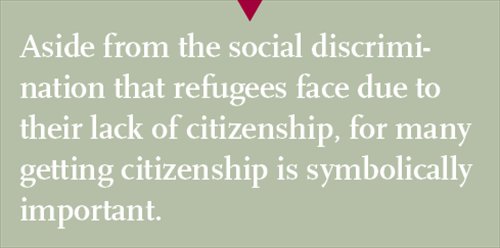
Compared with Laowachang, one of the best constructed refugee villages, 189 refugee village has only basic facilities.
Most homes are single-story and there is no tap water. When there is insufficient rainwater, they have to walk a long way to fetch something to drink.
It's not easy for men in the village to find a wife, due to their refugee identity and poor economic status. As a result, many have no choice but to marry other refugees or women from Vietnam.
Wang is one of very few local women to marry a refugee and move to the village, as she herself was a heihu (literally 'black household,' meaning person without a hukou) for a long time.
"I didn't think much about the nationality problem when I married my husband. I only got my own hukou a few years ago. My parents didn't register me when I was young," she said.
According to Wang, refugees still face hostility from people in non-refugee villages.
189 refugee village is downstream from another village. Very often, the farmers living upstream call them "dead refugees," and mock them by saying "you are drinking our urine."
"This is too hard to accept, especially as there are so many elderly people in our village. How can they say that to us?" said Tao.
Aside from the social discrimination that refugees face due to their lack of citizenship, for many getting citizenship is symbolically important. Every refugee interviewed by the Global Times reporter said that one of the main reasons they want citizenship is simply because they see themselves as Chinese.
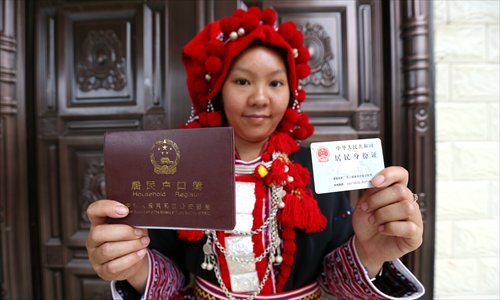
A woman dressed in the traditional costume of the Yao ethnicity holds her Chinese ID card and household registration. Photo: Cui Meng/GT
Changing for the better
In Laowachang, there are vast stretches of banana fields, which provide refugees with their main way to make a living.
After Deng and Li were elected to be the head and deputy head of the village six years ago, they banned all gambling, including mahjong, in the village.
"Gambling addictions made people lazy, we need to make our home better," said Li. Now most of the villagers have built two-story houses and more than 30 households out of the village's 118 households have cars.
"Our life is now much better than my relatives in Vietnam. They are envious of us. I wouldn't return Vietnam even if I was beaten almost to death," he told the Global Times.
In 2006, UNHCR António Guterres praised China's refugee resettlement as "one of the most successful integration programs in the world."
Zhuang Guotu of Xiamen University said that those refugees were not offered citizenship because they lacked documents. "The refugees can't provide evidence to prove that they originally came from China or their parents were from China. So it's hard to decide whether they are Chinese or Vietnamese."
Zhuang argues that although they can't prove their identity, most of their ancestors have made contributions to China. "Now the Vietnamese government does not want to take them home. Their demands should be addressed," he said.
"Refugee children who were born in China should be given Chinese nationality," Zhuang said.
In China, a child can get citizenship if at least one of their parents also has Chinese citizenship. Therefore, children whose parents are both refugees or one is refugee and the other is Vietnamese are classified as refugees too.
Deng Shaojin, vice director of the Hekou civil affairs bureau, said these refugees can now enjoy most of the civil rights available to Chinese citizens.
According to Deng, the government has given refugees money to build new homes since 2011. They are now also included in the local welfare system and have been given access to medical insurance.
The refugees are still managed by local civil affairs bureaus and elect their own leaders to manage them. Deng said that they are researching the possibility of becoming integrated into the local village and township governments like other local residents, as they currently cannot vote in these elections.
Newspaper headline: State of uncertainty